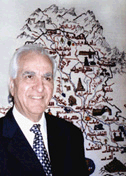Tourism of Stay or Stay Tourism
The positive and negative aspects of certain phenomena, which emerge from time to time, are often not considered but if they were taken seriously they could prove extremely beneficial. Thanks to the letter from Mr. Jamal Mahmud Najib, I was made aware of one of these phenomena which prompted me to write this article. The text of the letter is on our website (www.islamictourism.com).
Spain has discovered the phenomenon of large numbers of tourists who stay in the country for long periods: some buy houses or apartments in different tourist resorts and live there during their annual visits. Tourism promoters noticed this phenomenon, investigated it, and developed special marketing packages until it became one of the most important aspects of tourism in Spain. Before the tourists started buying houses, tourist villages, with magnificent sea views were constructed. The houses in these villages were full during the summer season but empty for the rest of the year. A five year tourist development programme was implemented to solve the crisis in this sector and the villages are now being used throughout the year to a greater or lesser extent.
Companies specialising in the construction of tourist accommodation have been commissioned to look for the best locations and build special accommodation complexes for long-stay tourists who arrive in Spain. These houses and apartments have become an investment and saving for people on limited incomes who have spent their life working as civil service employees in Northern Europe, England and other countries.
The construction of holiday villages is not confined to Spain: many other countries are building tourist villages, especially on the coasts, for the enjoyment of local and international tourists. But they have their problems, the sector is becoming increasingly competitive and the anticipated tourist revolution has not resulted due to a lack of long term planning to ensure the success of the ventures.
Before describing this phenomenon and the objectives of this form of tourism we will describe long-stay tourists and the popular long-stay tourism venues.
Long-stay tourism: where and for whom?
Long stay tourists are usually:
* Aged 40 year plus, with savings, who have already achieved many of the objectives, they have set for themselves in life;
* Tired of the hustle and bustle of daily life and eager for rest, enjoyment and relaxation;
* People with small children who want to relax in safe, familiar locations;
* People seeking warmer climates, those who enjoy a different environment or want to get away for a variety of reasons;
* Spiritual individuals who wish to be near the sacred places of the companions of the Prophet or holy men;
* Individuals interested in long-term private investment and investors aware of the potential of the tourist sector. They in turn encourage their friends to follow their example.
A group of my friends and relatives who live in Great Britain and Morocco have bought houses in Spanish tourist regions for vacations and as long-term investments. Tourist villages are constructed and transformed into flourishing cities full of life.
What are the ideal locations for long-stay tourists?
God has blessed Islamic nations with rivers and sources of fresh water, many with curative properties. Villages for long-stay tourists are nearby. Long stay venues include:
* The banks of rivers whose waters have been flowing from ancient times: the Tigris, the Euphrates, the Nile etc
* Areas with spring water;
* Mountain lakes and lakes in the valley:
* Water environments such as the marshlands of southern Iraq;
* Oases in the Egyptian, Libyan and Tunisian deserts and deserts in other Arab and Islamic countries;
* Sea sides;
* High-rise buildings in areas where accommodation is limited;
* Vertical lodgings such as those found in Lebanon;
* Mountains, characterised by pure and fresh air favoured by the inhabitants of arid regions;
* Snow-clad mountains for skiing and winter festivals;
* Religious tourism sties with tremendous potential, as highlighted by Islamic Tourism magazine.
There are nearly a billion and a half Muslims throughout the world. The hope of all Muslims, especially the elderly, is to spend some time in places with a spiritual, tranquil atmosphere. They want to be near the Kaaba, Medina and the mausoleums of the companions of the Prophet and saints of Islam.
If we look at the ancient and recent history of these places, we see how the mausoleums and their environs grew, blossomed and were transformed into cities to which millions of Muslims come time and time again during their lives. Every Muslim would like to make an investment 'in the divine'. Numerous urban expansion investment opportunities are found in the holy cities. It is a great honour for Muslims to participate in improving these regions blessed by God, which contain the remains of the companions of the Prophet and the holy men of Islam.
But how will such projects be financed when some of the local inhabitants near the holy sites do not even have a house, lodgings, or the means for earning a living? There are many individuals in the world today whose property investments are worth trillions. It is natural that all who have money want to invest it profitably and to guarantee their future in old age. In the same way, companies and individuals everywhere look for ideas and employment opportunities throughout the world. They only need ideas, definite plans and firm commitments as well as support from governmental authorities along with detailed laws that facilitate their work. These are universal criteria applicable to long-stay tourist accommodation, especially in Arab and Islamic countries.
What is required?
Every state that wants to accept this proposal must support its Ministry of Tourism, or establish one, and make resources available for various tourism projects including long-stay accommodation. This includes:
* Conducting an exhaustive survey to determine the most suitable venues for the construction of long-stay accommodation and tourist villages;
* Requesting each municipality to provide the Ministry of Tourism with proposals for the construction of lodgings and long-stay accommodation prepared by the municipality or private investors;
* Launching a media publicity campaign describing these projects and requesting citizens, and various establishments and institutions to participate and put forward their ideas.
* Setting up a special commission consisting of the relevant ministries (Planning, Interior etc), investors and interested parties to discuss the implementation of the recommendations of the survey;
* Supporting architects so they can complete their plans for the chosen regions, in coordination with the relevant government departments;
* Informing international and local companies and interested individuals about the relevant laws, projects and proposals;
* Ensuring that these projects are exempt from taxes during the construction stage and for a period of between ten to fifteen years thereafter;
* Establishing the necessary infrastructure for villages and long-stay accommodation sites and ensuring they are easily accessible to neighbouring regions and countries;
* Encouraging citizens to buy a second home and foreigners to make an investment in lodgings where they can spend their vacations;
* Encouraging foreigners, regardless of their country of origin, to acquire long-stay accommodation, facilitating the granting of visas and simplifying all bureaucratic procedures.
The investment, opportunities for long stay tourism and accommodation are unlimited. Long stay tourism is different from ordinary tourism which is short term and fluctuating depending on the vagaries of the market. Long stay tourism, on the other hand, allows for investment and economic growth and long-term social and cultural exchanges. It has its disadvantages as it can exert a negative influence on local societies and the environment but this can be limited through enlightened town planning and awareness on the part of local authorities and citizens.
Some readers could say that this is nothing new, because many tourist cities and accommodation built for sale to citizens and foreigners are already in existence. In Jordan, for example, investment in real estate is measured in three trillions the first clients being the Iraqis. Gulf companies are also participating in real estate investments and the construction of cities not only in their own countries, but in other Arab countries and throughout the world.
The aim of this article is to highlight the phenomenon of tourism of stay or stay tourism so that it can represent the axis of legal necessities, economic infrastructures and investments. The construction of long stay accommodation will become a permanent feature of the construction industry and will radically transform towns and cities.
We hope that the leaders of all Arab and Islamic countries give careful consideration to this phenomenon and ensure it is used to their advantage.
May Allah guide us to the best of deeds.
A. S. Shakiry
|

